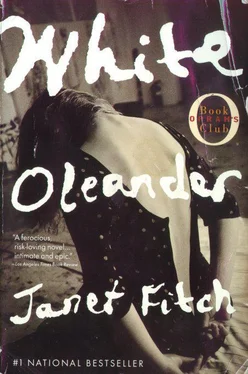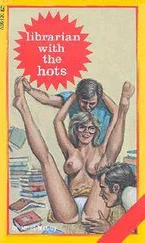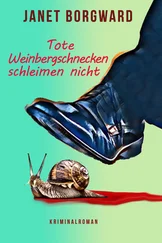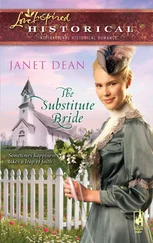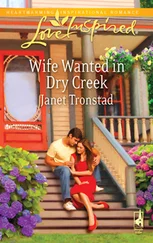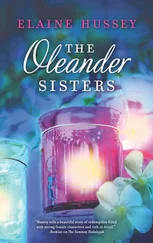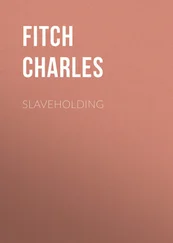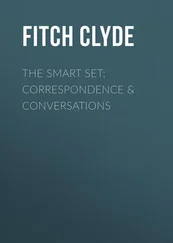Janet Fitch - White Oleander
Здесь есть возможность читать онлайн «Janet Fitch - White Oleander» весь текст электронной книги совершенно бесплатно (целиком полную версию без сокращений). В некоторых случаях можно слушать аудио, скачать через торрент в формате fb2 и присутствует краткое содержание. Жанр: Современная проза, на английском языке. Описание произведения, (предисловие) а так же отзывы посетителей доступны на портале библиотеки ЛибКат.
- Название:White Oleander
- Автор:
- Жанр:
- Год:неизвестен
- ISBN:нет данных
- Рейтинг книги:3 / 5. Голосов: 1
-
Избранное:Добавить в избранное
- Отзывы:
-
Ваша оценка:
- 60
- 1
- 2
- 3
- 4
- 5
White Oleander: краткое содержание, описание и аннотация
Предлагаем к чтению аннотацию, описание, краткое содержание или предисловие (зависит от того, что написал сам автор книги «White Oleander»). Если вы не нашли необходимую информацию о книге — напишите в комментариях, мы постараемся отыскать её.
White Oleander — читать онлайн бесплатно полную книгу (весь текст) целиком
Ниже представлен текст книги, разбитый по страницам. Система сохранения места последней прочитанной страницы, позволяет с удобством читать онлайн бесплатно книгу «White Oleander», без необходимости каждый раз заново искать на чём Вы остановились. Поставьте закладку, и сможете в любой момент перейти на страницу, на которой закончили чтение.
Интервал:
Закладка:
As we switchbacked up the hill, we passed a house where someone was practicing the piano before work. It was a Spanish-style place, white with a tile roof and a live oak in the tiny front yard behind a wrought iron fence. It looked so safe, something that could hold beauty like a pool glinting with trout.
Rena noticed me watching it pass. “You think they don’t got problem?” Rena said. “Everybody got problem. You got me, they got insurance, house payment, Preparation H.” She smiled, baring the part between her two upper teeth. “We are the free birds. They want to be us.”
We stopped before a house perched way on top of the hill, they had stuff at the curb. I jumped down, got the baby gate, the high chair with blue food-mottled pads, the playpen and the bouncer seat. Yvonne’s eyes turned dark when she saw what I was handing her. Her high color bleached to beige, her mouth pressed together. She grabbed the chair and threw it in the back, more roughly than necessary.
She curled up on the carseat when we were moving again, picked up her Seventeen and turned pages, her hands trembling. She closed the magazine and stared at the girl on the cover, a girl who had never been pregnant, never had a social worker or a filling. Yvonne stroked the water-wavy cover. I could tell, she wanted to know what that girl knew, feel how she felt, to be so beautiful, wanted, confident. Like people touching the statue of a saint.
“You think I’d look good blond?” Yvonne held the cover up next to her face.
“It’s never done me much good,” I said, rotating the lady-bugs, making them run.
I saw Claire’s face on the banks of the McKenzie, pleading with me to let the fish go. It was the least I could do. I would have to make my own luck anyway. I leaned out behind Niki and opened the bubble into the wind.
IT WAS quarter to eight when we pulled up in front of Marshall High. My eighth school in five years. The front building was faced with elaborate brick, but temporary trailers flanked it on every side. Yvonne lowered her head over the magazine, embarrassed to be seen. She had just dropped out of school this winter. “Hey,” Rena called to me as I got out of the van. She leaned across Niki, holding out a couple of folded bills. “Money makes world go around.”
I took the money and thought of Amelia as I shoved it in my pocket. “Thanks.”
Niki sneered at the kids sitting on the wall, finishing their cigarettes before class. “School sucks. Why don’t you blow it off? Rena doesn’t care.”
I shrugged. “I’ve only got one more semester,” I said. But truthfully, I was afraid to have one less thing in my life.
24
I SAT UP in bed at one in the morning, cotton stuffed in my ears, as Rena and the comrades partied down in the living room. Just now, they were wailing along to an old Who record cranked so loud I could feel it right through the floor. This was why Rena liked it down here among contractors and bakeries and sheet metal shops. You could make all the noise you wanted. I was learning, everything on Ripple Street was rock’n’roll. Niki sang with three different bands, and Rena’s personal soundtrack consisted of all the big seventies rock she’d first heard on black market tapes in Magnitogorsk. I tried to recall the melodies of Debussy, the gamelan, Miles Davis, but the Who bass line pounded it right out of my head.
To me this rock was just more faceless sex in a man’s world, up against a concrete wall behind bathrooms. Give me a Satie tone poem like light on a Monet haystack, or Brazilian Astrud like a Matisse line. Let me lie down in a half-shuttered room in the south of France with Matisse and the soft flutter of heavy-feathered white doves, their mild calls. Only a little time, Henri, before Picasso will come with his big boots. We should take our afternoon.
I missed beauty. The Tujunga night with too many stars, Claire’s neck as she bent over me, checking my homework. My mother, swimming underwater in the pool in Hollywood, the melody of her words. All gone now. This was my life, the way it was. Loneliness is the human condition, get used to it.
Across the room, Yvonne’s bed was empty, she had left with someone at about eleven to go to a party across the river. I sat up in bed, drawing by lamplight, chasing an indigo line of oil pastel on violet paper with a whispery silver. It was a boat, a dark canoe, on the shore of a moonless sea. There was no one in the boat, no oars, no sail. It made me think of the sunless seas of Kublai Khan and also of my mother’s Vikings sending their dead out on boats.
I blew on my hands, rubbed them together. The furnace wasn’t working, Rena still hadn’t fixed it. We just wore sweaters all the time. “Cold?” she said. “In California? You joke.” They weren’t feeling it, out there braying to the records, drinking Hunter’s Brandy, some high-octane Russian specialty that tasted like vodka flavored with nails.
I looked around the cramped, crowded room, like the stockroom of a Goodwill store. I imagined what my mother would say if she could see who I was now, her burning little artist. Just another used item in Rena’s thrift shop. You like that lamp with the bubbled green base? Name a price. How about the oil painting of the fat-cheeked peasant woman with the orange kerchief? For you, ten dollars. A bouquet of beaded flowers? Talk to Rena, she’d let you have it for seven-fifty. We had a furry Oriental rug, and a solid oak table, only slightly tilted, along with five unmatched chairs, special today. We had an enormous tiki salad set, and a complete Encyclopedia Britannica from 1962. We had three matted white cats, cathair over everything, cat smell. All this, and an old-fashioned hi-fi in a fruitwood cabinet and a stack of records from the seventies higher than Bowie’s platform shoes.
And our clothes, Mother, how do you like our clothes? Polyester tops and lavender hiphuggers, yellow shirts with industrial zippers. Clothes floated around from closet to closet until we were bored, then we sold them and bought something else. You wouldn’t recognize the girl I’ve become. My hair is growing out, I found a pair of Jackie O sunglasses and I wear them all the time.
My clothes are gone, the rich orphan clothes from Fred Segal and Barney’s New York. Rena made me sell them. I’m sure you’d approve. We were unloading in the parking lot of Natalia’s Nails one Saturday. I was arranging coffee mugs when I saw Rena pulling my clothes out of a black plastic garbage bag. My French blue tweed jacket, my Betsey Johnson halter dress, my Myrna Loy pajamas. Hanging them on hangers on the rolling rack.
I snatched them off the rack, stood there shaking. She had gone through my drawers, my closet. “These are mine.”
Rena ignored me, shook out a rose-and-gray long skirt, pinned it to a hanger. “Why you need? Dressed best at Marshall High School? Maybe Tiny Thai, Trader Joe? Maybe Melrose Place call for you to be star?” She bent and took out an armful of my Fred Segal T-shirts, dumped them into my arms. “Here.” She put a roll of tape and a marker on top. “You name price, you keep money, ladno?” She kept pulling my things out of plastic garbage bags, hanging them up. Dove-gray high-waisted pants with an Edwardian jacket, a charcoal velvet collar. White shirt with ruffled front. My Jessica McClintock dress with the white cutwork collar.
“Not that,” I said. “Come on, have a heart.”
Rena squinted at me, blowing a strand of her matte black hair out of her face, exasperated. “You get good price for that. What you saving it for, tea with little Tsarevich Alexei? They shot him 1918.” She took the dress out of the bag, shook it and hung it back up. “Is fact.”
I stood there, my arms full of the silky T-shirts. Egyptian cotton. Sour pliers squeezed my throat, juicing it like a lemon. She couldn’t make me sell my clothes. That witch.
Читать дальшеИнтервал:
Закладка:
Похожие книги на «White Oleander»
Представляем Вашему вниманию похожие книги на «White Oleander» списком для выбора. Мы отобрали схожую по названию и смыслу литературу в надежде предоставить читателям больше вариантов отыскать новые, интересные, ещё непрочитанные произведения.
Обсуждение, отзывы о книге «White Oleander» и просто собственные мнения читателей. Оставьте ваши комментарии, напишите, что Вы думаете о произведении, его смысле или главных героях. Укажите что конкретно понравилось, а что нет, и почему Вы так считаете.
